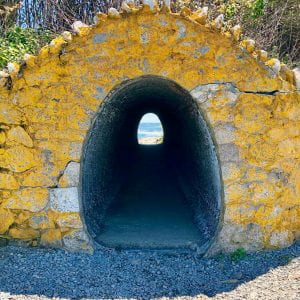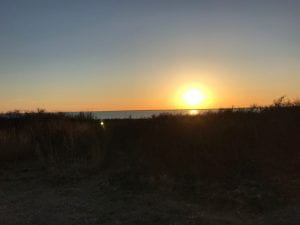
My place that represents me the most in this life is the ocean and beach front. I grew up in the City of Fall River my whole life, so I was use to the hustle and bustle and close together housing, little to no nature. So in the summers my family would make it a point to have multiple beach weekends. although Newport was not very far going to the cliff walk and beaches would take me to another world that was full of peace and serenity. This place was who I am. The waves crashing back and forth like the curiosity of my thoughts and the air and freeness of the summer was like my desires for life. I wanted to relax and be free of city life. This place was what my life wanted.
When I take these pictures it is to capture the exact moment of beauty and peace in the world. It is as if I am my true authentic self and calm with nature. In Williams “Home Work” the first sentence states ” Place +people = Politics” (pg3) the reading dives into Utah and the desert and one of the ways William ignites conversation if over stories. I feel this to be a very powerful way to get across a point or mission. Stories can evoke emotion of people and bring a closeness or togetherness that other methods can not. For example my photos, at first you just see places that have water and light but it is the story that I express that brings to mind a place, a meaning. With story my still image now because more.
Kingsolver’s theory that we as humans “need wilderness” is true in my eyes. I think often we as people get distracted by life and the things around us. The cities, the technology and we get consumed by the artificial of life. but taking a moment to break and really be one of real life and nature is something we can all benefit from. Kingsolver says
” I have come to depend on these places where I live and work. I’ve grown accustomed to looking up from the page and letting my eyes relax on a landscape upon which no human artifact intrudes.”
Just like William she states she has places where all her stories begin. getting away and embracing nature for what it is, can be freeing and a form of peace and tranquility that we often forget is available to us. Coming from a city I do feel like it can be hard to form these connections with earth or build the bond of place but it is not impossible. I think that anyone can truly experience place you just have to acknowledge the beauty of yourself and the world around you.
I actually think that my personal experiences and history with being a city girl make me have deeper realizations of the beauty around me and my place. When I go to the beaches or the cliff walks it is like I am breathing for the first time. It is always an experience that takes over me because I know I don’t get this lifestyle, or this moment often. My mind and body are overjoyed with sense of safety and relaxation that I believe I enjoy more than most people do.
Annotated Sources:
Kingsolver, Barbara. “Knowing Our Place.” Small Wonder. HarperCollins Publishers, 2002.
Kingsolver talks about her experiences with encountering nature in order to describe how important it is to have a connection to nature and wildness. In the reading, she discusses what it is like to live surrounded by nature and the way in which she sees the value in building a connection with it. Kingsolver examines nature as it impacts her writings and her daily life.
Williams, Terry Tempest. “Home Work.” Red: Passion and Patience in the Desert. Vintage Books, 2002.
Williams discusses the struggles between citizens of Southern Utah and the government involvement regarding the protection of nature. Williams writes about the usage of wilderness for commercial development rather than allowing it to be the unregulated wilderness it is meant to be.


Cassandra,
Those are beautiful pictures! I love what you were saying about how adding your personal story to the photos gave them more context and thus let the reader connect to what you were saying. I learned a lot about that topic in my women and gender studies 101 class. The term for it is consciousness-raising. That’s basically using a personal anecdote in order to inform people about an issue. While what you were saying is more of a casual situation, I think it still relates. You feel passionately about where you came from, which most people, arguably, do. Everyone can share a story about how their surroundings have helped mold them to who they are today. Personalizing an environment is a great way to make people care, because I think people are more likely to empathize with other humans than with an environmental cause that may never affect them personally. For example, when talking about melting ice caps, it can feel distant. Although we SHOULD care that the ice caps are being hurt because its oppression of nature, it typically takes that connection of “and then the water will melt, then people will suffer this way and that way, etc.” I’ve been to Rhode Island and never personally felt that connection, but after reading your story, I care more. I think we should all be talking about the environment in that way.
hi!
I enjoy doing photography on the side and this weeks blog really spoke to me when we were discussing understanding place. I emphasized the idea of story because of my takeaway from the Williams reading. She opens up her reading with the statement Place+ People= Politics. she then discusses that she expresses place through story. I also feel that the bell hooks reading was very on brand with my defining of my place. In the reading “touching earth” she discusses that if we as people can love the earth and build that bond and connection we can fully love ourselves more. Rhode Island is not the most exciting place for many but it is a little escape for me when it comes to the city life of Fall River, the difference in environment makes me feel a way the city can never. I think personalizing the environment makes it more real to people and touches them in ways fact may not.
Hi Cassandra!
I very much enjoyed reading about your person connection with the ocean. Toward the end of your post, the phrase you used, “personalizing the environment” was a really great way to look at Williams’s thoughts on “people+place=politics.” For me, I think it holds true that the connections we share with our places give us a heightened awareness of the ecological issues that impact these locations. Like Williams is increasingly aware of issues in the Utah deserts, I personally felt personally aware with the water pollution that impacted the largest body of water in my home town. Correct me if I’m wrong, but I’m sure that having a connection to the ocean allows you to feel more aware of the pollution issues and other negative impacts that the ocean is facing.
As for Kingsolver’s views on needing wildness, I agree that we can get very distracted with the society we live in. I identified that it is difficult, especially for those in cities, to have a personal connection with nature unless they choose to step outside of the society that caters them to go form this connection. I believe that personalizing our connections is very important, but to build off of the comment of Aorloski, they point out that sometimes issues like the melting ice caps can seem distant but have results that impact us. I think that it is also just as important to keep in mind the struggles that we are not necessarily connected to as well.